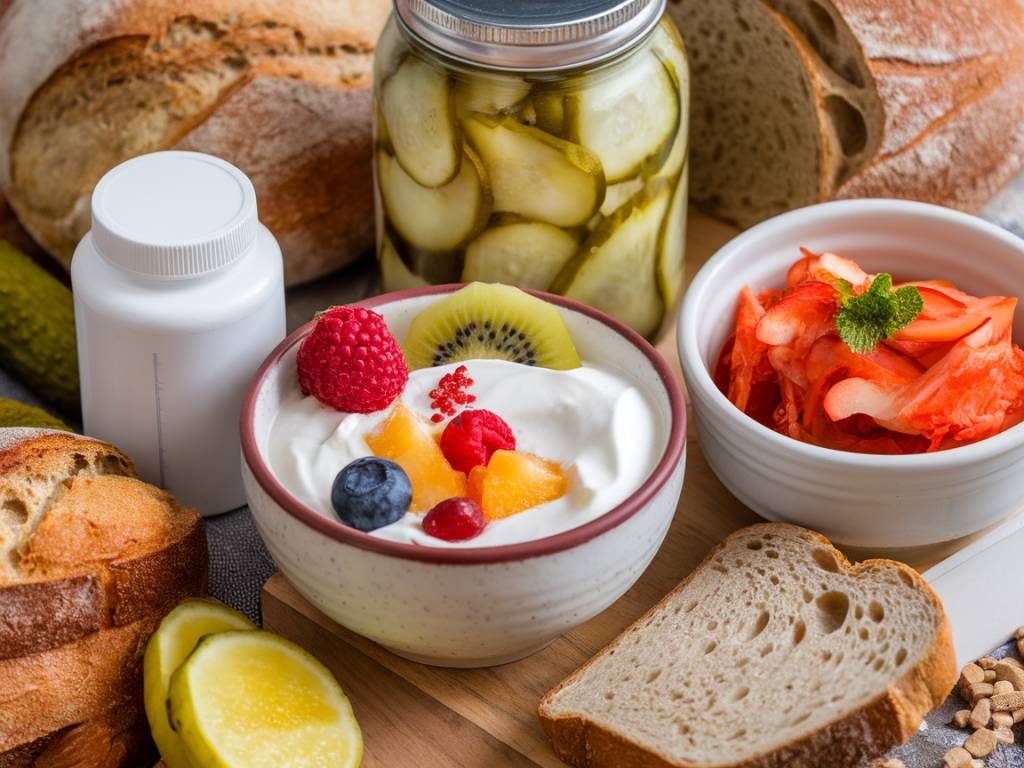The Importance of Gut Health
When was the last time you thought about your gut? Probably not too often, right? Yet, there’s a bustling ecosystem right there in your digestive tract that plays a central role in your overall health. Scientists often refer to the gut as the « second brain » because of its incredible influence on physical and mental well-being. From digestion to immune function, a healthy gut is pivotal.
But what happens when this delicate balance in your gut is disrupted? Issues like bloating, fatigue, mood swings, or even skin problems can surface. Enter: probiotics. These tiny microorganisms might hold the secret to maintaining—and even restoring—a happy, healthy gut.
What Are Probiotics?
Probiotics are live microorganisms, primarily bacteria and yeast, that provide health benefits when consumed in adequate amounts. Not all bacteria are bad! These « friendly bacteria » help maintain harmony in your gut by crowding out harmful microorganisms and restoring balance.
You can find probiotics naturally in fermented foods like yogurt, kefir, sourdough bread, and kimchi. Alternatively, probiotic supplements have become increasingly popular among those looking for a boost in their gut health.
How Probiotics Work Their Magic
You may be wondering: how exactly do probiotics improve gut health? Think of your gut as a vibrant community—probiotics act like the friendly neighbors who clean up after others, keep the peace, and ensure everything runs smoothly.
- They increase the diversity of your gut microbiome, which is crucial for resilience against pathogens.
- Probiotics enhance digestion by breaking down food and helping with nutrient absorption. Ever notice how certain foods seem easier to digest? Thank probiotics!
- They bolster your gut lining, which acts as a barrier against harmful substances.
- Probiotics communicate with your immune system to help modulate inflammatory responses. A stronger immune system often starts in the gut.
Signs You Might Need Probiotics
Is your gut begging for help? Here are some signals that your microbiome might be out of balance:
- Frequent bloating, gas, or digestive discomfort
- Irregular bowel movements (constipation or diarrhea)
- Recurring infections, like urinary tract infections
- A weakened immune system or falling sick often
- Skin issues, such as eczema or acne
- Mood disorders, including anxiety or depression
While probiotics aren’t a cure-all, they can make a noticeable difference for many of these conditions.
Food vs. Supplements: Which Is Better?
Good news: you don’t need to overhaul your lifestyle to incorporate probiotics! While supplements can be helpful for targeted support, probiotic-rich foods may already be in your fridge:
- Yogurt: Look for « live and active cultures » on the label.
- Kefir: A tangy, drinkable fermented milk packed with probiotics.
- Kimchi and Sauerkraut: Probiotic-rich fermented vegetables offering gut-boosting benefits.
- Miso and Tempeh: Plant-based fermented soy products that are a staple in many diets.
- Kombucha: A fermented tea that’s as trendy as it is beneficial.
If fermented foods don’t appeal to your palate, probiotic supplements can fill the gap. However, always consult a healthcare professional before starting a new supplement regimen, especially if you’re pregnant, nursing, or have underlying health conditions.
Probiotic Strains: Not One-Size-Fits-All
A key thing to note is that not all probiotics are the same. Different strains of bacteria serve distinct purposes, so choosing the right one is crucial to reaping the benefits. Here’s a simple breakdown:
- Lactobacillus acidophilus: A go-to for digestion and lactase production, often linked to reducing symptoms of lactose intolerance.
- Bifidobacterium bifidum: Commonly found in probiotic yogurts, it aids digestion and boosts immunity.
- Saccharomyces boulardii: A yeast-based probiotic particularly effective for gut issues arising after antibiotics or diarrhea.
- Streptococcus thermophilus: Often combined with Lactobacillus to improve digestion and nutrient absorption.
When selecting a supplement, pay attention to the strain types and Colony Forming Units (CFUs) listed on the bottle. CFUs indicate the number of live organisms in each dose; higher isn’t always better, but the right balance is essential.
Real-Life Impact of Probiotics
Not sure this all applies to you? Imagine this. Sarah, a 32-year-old mom of two, struggled with persistent bloating and erratic bowel movements for years. After consulting her doctor, she added a daily probiotic supplement with Lactobacillus rhamnosus to her morning routine. Within a month, she noticed reduced bloating and steadier energy levels throughout the day.
Or take John, a fitness enthusiast who loves experimenting with his meals and keeps kombucha stocked in his fridge. His consistent intake of probiotic-rich foods has not only improved his digestion but also boosted his immune system, helping him stay active year-round.
These small changes can translate into big benefits. Whether you’re tackling ongoing digestive issues or looking to enhance overall well-being, probiotics provide an actionable step toward better health.
Tips for Getting Started
If you’re inspired to make probiotics part of your routine, here are some easy tips to start:
- Incorporate at least one probiotic-rich food into your daily meals, like a serving of yogurt or fermented veggies.
- Be consistent. Probiotic benefits don’t appear overnight, so make this a long-term habit.
- Listen to your body. Adding new foods or supplements could cause temporary discomfort while your gut adjusts.
- Pair probiotics with prebiotics. Prebiotics are « food » for healthy bacteria and can be found in bananas, garlic, onions, and whole grains.
Probiotics are a natural, low-risk way to give your gut health the attention it deserves. A little effort can go a long way in supporting a thriving microbiome and, by extension, your overall wellness.
